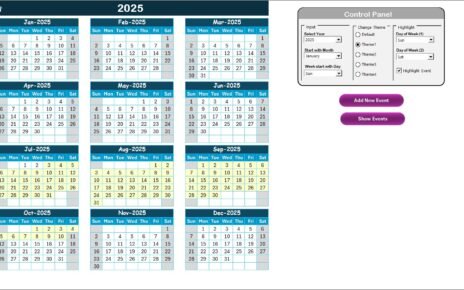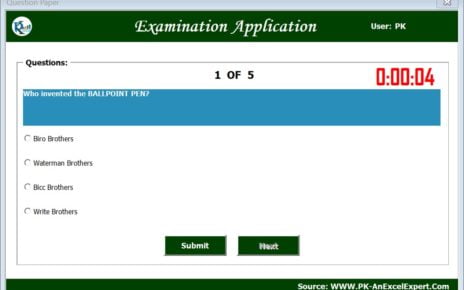In today’s fast-paced world, it’s easy to forget important tasks, meetings, or deadlines. Missed emails or follow-ups can lead to project delays, lost opportunities, or miscommunication. But what if there was a simple, no-cost solution that helps you automatically send email reminders right from your Excel file?
The Email Reminder Scheduler in Excel is the perfect answer. This ready-to-use tool is designed to help you streamline your communication and ensure you never miss a critical deadline again.
In this article, we’ll explore everything you need to know about this Excel-based email automation tool — from its key features to benefits, best practices, and FAQs.
Click to Purchases Email Reminder Scheduler in Excel
What is an Email Reminder Scheduler in Excel?

An Email Reminder Scheduler in Excel is a powerful automation template that enables users to schedule and send email notifications directly from Excel using Outlook. This tool is ideal for professionals, businesses, and teams that want to stay on top of important tasks without switching between apps.
With this tool, you can:
-
Enter email details like recipient, subject, body, and reminder time.
-
Automatically send reminders through Microsoft Outlook.
-
Track the status of each reminder to ensure it was sent.
And the best part? It doesn’t require any third-party software.
Key Features of the Email Reminder Scheduler
This template offers simplicity with strong functionality. Let’s walk through its main features:
User-Friendly Interface
The tool is built within a single worksheet titled Email Reminders. You don’t need to navigate multiple tabs. Everything happens on one screen.
Input Fields
Easily fill in the following fields for each reminder:
-
Recipient Name
-
Email Address
-
Subject
-
Body of the Email
-
Reminder Date
-
Reminder Time
-
Status (✔ Sent / ✘ Pending)
One-Click Buttons
At the top, you’ll find two important buttons:
-
Run and Schedule Reminder – Sets up your reminder using the specified date and time.
Outlook Integration
Once configured, Excel communicates directly with Outlook to send scheduled emails without manual intervention.
Real-Time Status Update
Each email reminder gets marked as ✔ Sent once the mail goes out, helping you keep track of completed alerts.
Why Use Excel for Email Reminders?
While there are apps like Google Calendar or project management tools, many users prefer Excel because:
-
It’s customizable.
-
No internet dependency (works offline via Outlook).
-
Perfect for teams already using Excel for planning or project tracking.
-
No additional subscriptions required.
Click to Purchases Email Reminder Scheduler in Excel
Advantages of Email Reminder Scheduler in Excel
Let’s break down the benefits of using this simple yet powerful tool:
1. Saves Time
You don’t have to remember to send each reminder manually. Once scheduled, the tool does the rest.
2. Improves Communication
Whether it’s client follow-ups, task reminders, or payment alerts — this tool ensures no message is missed.
3. Centralized Data
You have all your scheduled email data in one place — searchable, sortable, and auditable.
4. Simple to Customize
You can easily tweak the template to add more fields like priority level, task type, or CC/BCC options.
5. Cost-Free Automation
No need to buy email automation tools. As long as you have Excel and Outlook, this tool works.
How to Use the Email Reminder Scheduler
Follow these simple steps to get started:
Step 1: Open the Template
Download and open the “Email Reminder Scheduler” Excel file.
Step 2: Enter Email Details
Fill out the following columns in the Email Reminders sheet:
-
Recipient
-
Email Address
-
Subject
-
Body
-
Reminder Date
-
Reminder Time
Step 3: Click “Run and Schedule Reminder”
This sets up the logic to check when the reminder time is due.
Step 4: Click “Stop Reminder” (Optional)
Use this if you want to stop the future emails click on this button.
Step 5: Monitor Status
After the email is sent, the Status column updates to show ✔ Sent.
Use Cases for Email Reminder Scheduler
This tool is highly flexible and works for a variety of use cases:
✅ HR Teams: Send interview or onboarding reminders to candidates.
✅ Project Managers: Schedule milestone or review alerts.
✅ Finance Teams: Automate vendor payment reminders.
✅ Sales Teams: Set up follow-up emails with prospects.
✅ Event Planners: Send RSVP or task coordination reminders.
Best Practices for Using Email Reminder Scheduler
To get the most out of this tool, follow these best practices:
1. Double-Check Email Addresses
Avoid errors by validating email formats before scheduling.
2. Keep Your Outlook Open
For emails to send automatically, Outlook must be running in the background.
3. Use Clear Subject Lines
Make the reminder subject relevant and easy to identify.
4. Don’t Overload with Attachments
If you customize the tool to include attachments, limit file size for better performance.
5. Backup Your File
Create periodic backups to avoid data loss.
Tips to Customize the Template Further
Want to go beyond the basics? Here are some ideas:
-
Add dropdown menus for reminder types (e.g., “Follow-up”, “Meeting”, “Payment”).
-
Use conditional formatting to color-code urgent tasks.
-
Insert formula-based alerts for overdue reminders.
-
Link to external files or calendar events.
-
Add CC/BCC columns with optional inputs.
How Does It Work Behind the Scenes?
The magic lies in VBA (Visual Basic for Applications). A simple macro checks each row in the reminder table. If the current date and time match the scheduled time, it:
-
Drafts the email using Outlook.
-
Sends it.
-
Updates the status column.
You don’t need to touch the code unless you want to customize it — and even then, it’s beginner-friendly.
Is It Safe to Use?
Yes. The tool sends emails only via your local Outlook client. Your data stays on your system. No external servers or plugins are involved.
However, always run trusted Excel templates. If you’re downloading this from a third-party source, make sure it’s verified.
Who Should Use This Tool?
Anyone who regularly communicates via email and manages reminders in Excel can benefit:
-
Freelancers
-
Small Business Owners
-
Admin Professionals
-
Operations Teams
-
Remote Workers
Conclusion: Boost Productivity With Smart Email Reminders
The Email Reminder Scheduler in Excel is an incredibly useful tool that simplifies your workflow. Instead of relying on memory or toggling between multiple tools, this single-sheet solution takes care of all your reminder needs.
It combines the flexibility of Excel with the communication power of Outlook. No coding knowledge is required, and the benefits are immediate. You stay organized, consistent, and on top of every deadline.
So why wait? Download the template and never miss a reminder again.
❓ Frequently Asked Questions (FAQs)
Q1. Can I schedule recurring reminders?
Answer: Not by default. However, you can duplicate rows with future dates or modify the VBA to support repetition.
Q2. Will this work with Gmail or other email clients?
Answer: This template is designed specifically for Microsoft Outlook. It won’t work with Gmail unless you use Outlook configured with your Gmail account.
Q3. Do I need to enable macros?
Answer: Yes. The template relies on VBA macros. You must enable macros when prompted to use the automation features.
Q4. Can I use it on Mac?
Answer: This tool works best on Windows with Excel and Outlook. Mac versions of Excel and Outlook have limited VBA support, which may restrict functionality.
Q5. Is there any limit on how many reminders I can schedule?
Answer: No hard limit, but performance may drop slightly if your sheet contains thousands of rows. For best results, keep it under 1000 reminders.
Q6. What happens if Outlook is closed?
Answer: Emails won’t be sent unless Outlook is running in the background. Always keep Outlook open during reminder hours.
Q7. Can I send attachments with this?
Answer: Not in the basic version, but with a few lines of additional VBA code, attachments can be added to the reminder emails.
Visit our YouTube channel to learn step-by-step video tutorials



